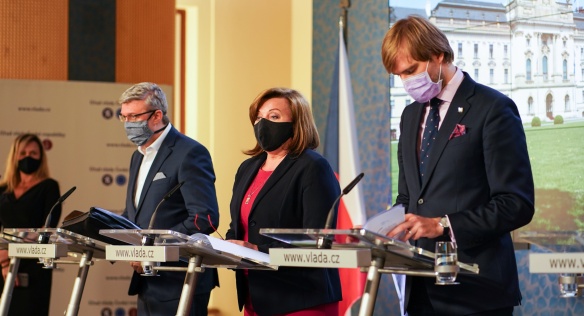Press Advisories
4. 5. 2020 20:57
Government approves further proposals to help businesses, from 11 May cross-border passenger transportation to resume
If Parliament will agree, the partners of small limited liability companies that were damaged during the coronavirus crisis will be able to ask the state to pay a compensation bonus. The proposal of a legal amendment on the compensation bonus in connection with the crisis measures related to the occurrence of the SARS-CoV-2 coronavirus, which the government approved and has passed on the Parliament to be heard in the status of legislative emergency, also counts on this.
According to the approved proposal, the compensation bonus should amount to 500 crowns a day, retroactive from 12 March to 8 June. Thus, the state will be able to contribute as much as 44,500 crowns to small businesses. The condition is that the company can have at most two partners (or more, but only if they are in a direct family relationship). The company will also have to fulfil several other criteria, for example that it does not draw on any other form of financial support from the state. The Ministry of Finance press release (in Czech language) contains more details.
The government will also submit a legal amendment for some modifications in the area of the electronic records of sales in connection with the announcement of the state of emergency. It will ask the lawmakers to postpone the electronic records of sales (ERS) for all until the end of the year 2020 due to the current situation. This means that those subjects for whom the ERS already applies would still not have to record sales, nor would those from the third and fourth waves who were supposed to start with the recording of sales. You can find further information in the Ministry of Finance press release (in Czech language).
An amendment on some measures to decrease the effects of the SARS-CoV-2 coronavirus epidemic in the area of the protection of employees when their employers are insolvent is also heading to Parliament. The proposal reacts to the government measure from 24 April, according to which creditor’s insolvency petitions submitted from 24 April until 31 August are not taken into consideration. Employees do not, however, have the right to claim owed wages through the Czech Labour Office due to this measure. The Ministry of Labour and Social Affairs has therefore proposed, for the purposes of the law to protect employees when the employer is insolvent, to also consider the employer to be in a state of insolvency if it does not satisfy its employees’ due wage claims. More about the proposal in the press release of the Ministry of Labour and Social Affairs (in Czech language).
The government also agreed with the proposal to increase subsidies, which the Ministry of Industry and Trade provides to self-employed persons (SEPs) looking after children up to 13 years of age and handicapped persons up to 26 years old. Until now, such persons could get 424 crowns per day for the second half of March as part of the Care-giver’s subsidy programme for SEPs. With regard to the situation and on the basis of today’s agreement by the government, this week the Ministry will announce further subsidies for April, while increasing the provided subsidy to 500 crowns per day. You can find further information in the press release of the Ministry of Industry and Trade (in Czech language).
The government also approved the plan of the Ministry of Industry and Trade to contribute to businesses that were affected by the government’s restrictive preventative measures to cover the rent for their business premises in the form of a subsidy programme. With the COVID - Rent subsidy programme, the state should pay tenants half of their total rent for the period of from April to June 2020 in the form of subsidies. The amount of the support would be limited in accordance with valid European regulations to a maximum of 20 million crowns. The condition is that the tenant will submit a confirmation from the lessor in the form of a supplement to the lease agreement that it has provided the tenant a discount in the amount of 30 per cent of the rent. Thus, the tenant itself would only pay twenty per cent of its rent.
The ministers have also agreed with the proposal to resume cross-border personal mass transportation from Monday 11 May. The government cancelled its previous restriction, so trains and buses will be able to travel to and from foreign countries without restrictions. Only air traffic remains restricted. It is still only possible through Prague’s Václav Havel Airport.
The current rules for crossing the border will also ease up on the same date. The government has decided to cancel the currently-valid measures and to replace them with new ones, which permit all citizens to cross the state border at selected border crossings that were previously only used by those commuting for work reasons. At the same time, three more crossings will be opening on the border with Germany, specifically Dolní Poustevna, Hřensko and Kraslice. The railway corridors to Germany and Austria will also be accessible. More in the press release of the Ministry of the Interior (in Czech language).
Rules for foreigners entering the Czech Republic also to ease up. Now, for example, seasonal workers will be able to enter, as will those who have long-term visas for the purpose of getting a residence permit. Nevertheless, they all will have the obligation of submitting a confirmation of a test for the covid-19 illness when entering.
The government also decided to cancel the imposed work obligation of university students from 11 May and agreed to provide half a million protective masks from the Ministry of Health’s stock to help Italy. It also approved further exceptions for wearing masks from 5 May (in Czech language), specifically for teachers in preschools, for children and students and teachers during lessons in schools. It also permits exceptions for the period necessary to make portrait photographs, e.g. for wedding photographs.
As part of the regular agenda, the government also approved the proposal for the operation of Czech soldiers and their equipment in foreign operations in the years 2021 and 2022 with a view towards 2023. Based on this proposal, which also has to be approved by Parliament, Czech soldiers could continue to operate, for example, in Iraq, Afghanistan, Mali and the Balkans. More in the press release from the Ministry of Defence (in Czech language).
Useful information
- Hotline
Ministry of Transport
+420 225 131 820
Ministry of Industry nad Trade
+420 224 854 444
Ministry of Foreign Affairs
+420 224 183 100
+420 224 183 200
Ministry of Interior (borders, security)
+420 739 608 533
Ministry of Education, Youth and Sports
+420 778 725 602
- Current information on Covid-19 caused by the Chinese coronavirus on the website of the Ministry of Health – information for citizens and healthcare workers, current data.
- Traveling During the State of Emergency
- The European coronavirus response team.







